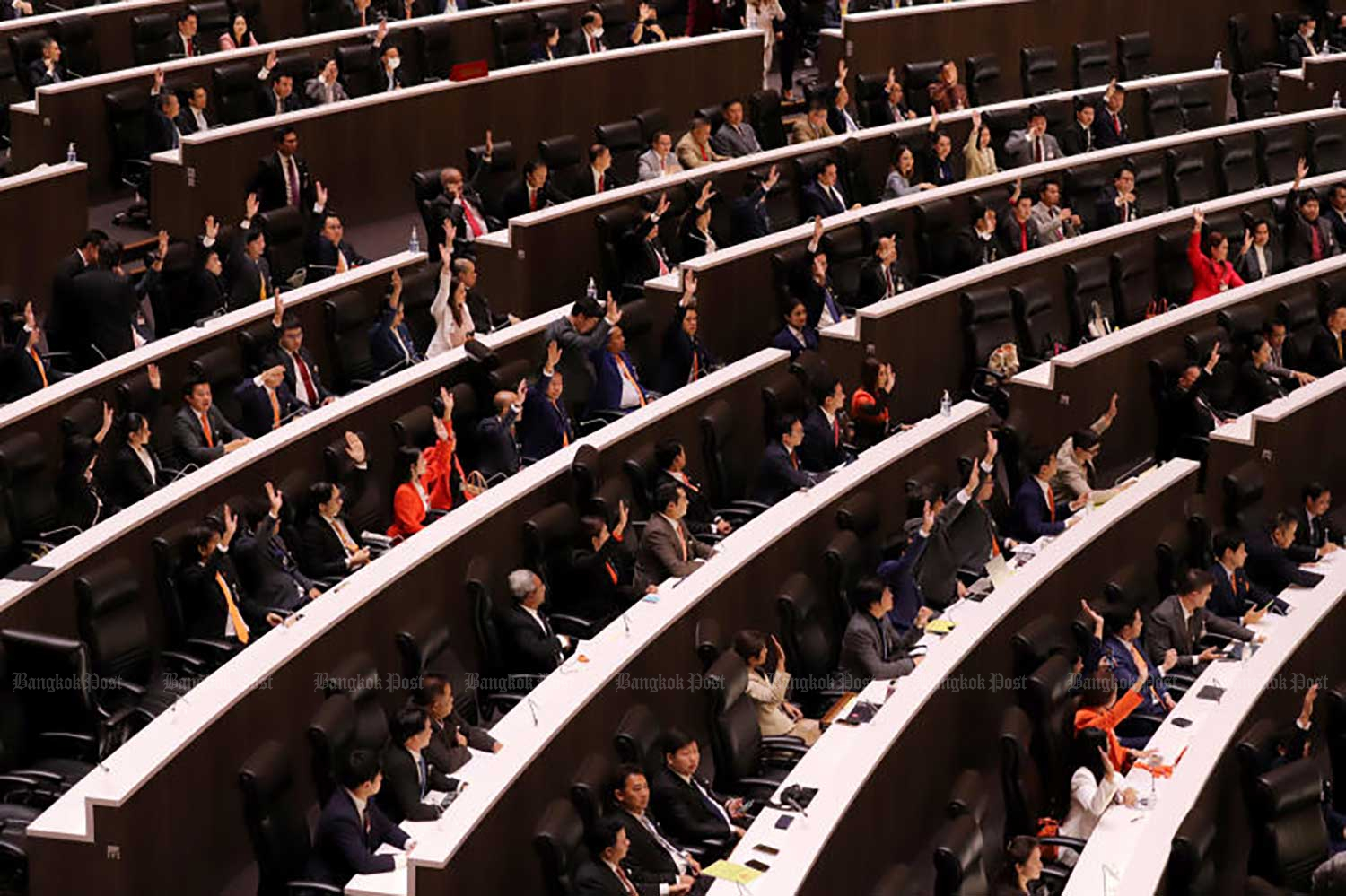
Parliamentarians challenged sole prime ministerial candidate Pita Limjaroenrat over his party’s plan to amend the law that protects the royal institution and questioned his past shareholding in iTV, before a vote on his nomination on Thursday.
House representatives and senators spent six hours expressing their opinions on whether they should choose the leader of the Move Forward Party as the country’s 30th prime minister.
Parliament President Wan Muhamad Noor Matha closed the debate and proceeded with the vote starting at 3.52pm, with 676 parliamentarians in attendance. However, Mr Pita still needs 375 votes — a simple majority of 749 combined House and Senate seats — to win the office.
Outside the parliament complex, crowds were beginning to gather, with orange-clad supporters of Move Forward nervously monitoring the vote to gauge whether Mr Pita could achieve a majority.
Police have declared an area within a 50-metre radius from the parliament a no-protest zone. Shipping containers draped with canvas banners portraying pleasant touristic scenes were lined up along Thahan Road. Two anti-riot armoured vehicles were seen nearby.
Inside the chamber, most speakers opposed to Mr Pita’s nomination trained their attention on Move Forward’s plan to amend Section 112 of the Criminal Code, the lese-majeste law.
Chada Thaiset, an opposition Bhumjaithai MP for Uthai Thani, said that any change to Section 112 would cause unrest.
“If you let people insult the monarchy without any laws to keep them in check, our country will burn,” he said. “How about I propose a law allowing people to shoot those insulting the monarchy?”
The law protects the royal institution from offences, insults and threats. But Move Forward contends that has been used mostly by those in power to silence their critics.
Mr Chada said that apart from Move Forward, the seven other coalition allies did not support any change to Section 112. However, Mr Pita has always insisted that his party would propose to amend the section by itself. The proposal is not in the MoU that the eight-party coalition signed.
United Thai Nation MP Wittaya Kaewparadai said Move Forward had brought abnormality to Thai politics because no political party had ever proposed any change to the lese-majeste law.
“At present, 10 political parties in the House, seven other parties that are the coalition allies of MFP and most senators do not support any change to Section 112. This is political abnormality. Only one political party proposes what no other parties ever think about,” Mr Wittaya said.
Satra Sripan, a United Thai Nation MP for Songkhla, said amending Section 112 would cause division and create hatred in society.
Senator Khamnoon Sitthisamarn said a previous MFP proposal to amend the lese-majeste law would either reduce jail terms or even lift punishment for offences against the royal institution.
Senator Praphan Khumee told the joint sitting of the House and the Senate that Mr Pita was unqualified to serve because of his past holding of 42,000 shares in the defunct broadcaster iTV Plc.
The constitution prohibits a shareholder in a media organisation from running in a general election.
Mr Praphan warned parliamentarians that if they voted for an unqualified person, they could be considered as performing duties or exercising their authority in an unconstitutional manner.
Mr Pita told parliamentarians that he was qualified for the premiership, adding that he had never been informed officially about any questions related to his MP qualifications.
He was referred to the move by the Election Commission, which has asked the Constitutional Court to rule on his eligibility in light of the iTV shareholding.
Earlier, Mr Pita complained that the EC never informed him of its doubts or invited him to defend himself.
The EC on Thursday stated that the constitution allowed it to find relevant facts and seek a ruling from the Constitutional Court without having to press an accusation against Mr Pita and call for his defence. It would be up to the court to decide whether it wants to hear from the candidate.
Explanations from an accused person are sought when the EC is dealing with alleged violations of electoral and political party laws, the EC said. In cases where MP qualifications are in doubt, the EC says it is empowered to gather facts without calling an MP to lay a charge.
The EC also denied complaints by Mr Pita and his party that its fact-finding process in the case was unusually quick.

Supporters of Move Forward Party prime ministerial candidate Pita Limjaroenrat sell merchandise outside the Parliament complex in Bangkok before the vote to decide on the country’s next prime minister. (Photo: AFP)

Shipping containers draped with banners showing touristic scenes are placed in front of the Parliament complex to provide security on Thursday. (Photo: AFP)
